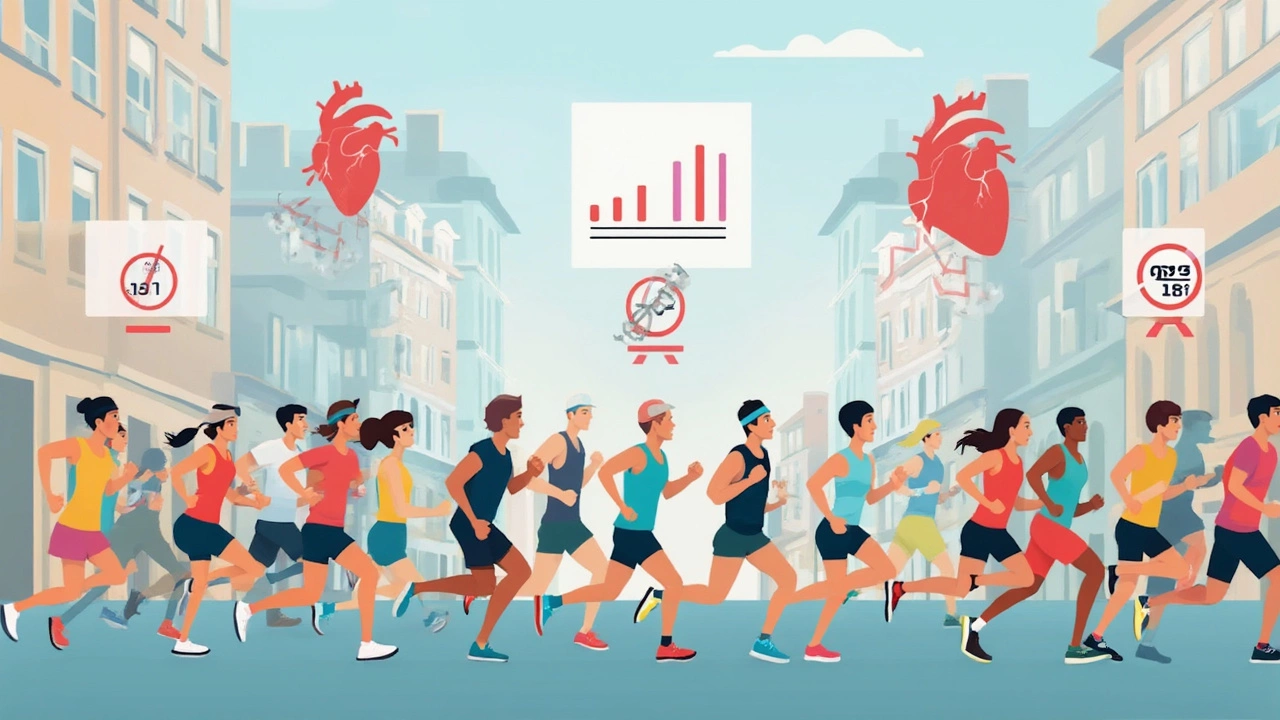Run a marathon and you'll hear it all—some say it's great for your health, others warn you’re shaving years off your life. It’s no secret that 26.2 miles is a brutal distance. So, is pushing your body that far a ticket to a shorter life, or could it actually help you stick around longer?
If you’ve ever wondered whether marathon training is doing you more harm than good, you’re not alone. Let’s get real about what your body goes through on those long runs, the actual risks, and what the studies say about living longer. No scare tactics, just practical things you should know before you sign up for your next race.
- What Happens to Your Body During a Marathon?
- Marathon Running and Life Expectancy: What's the Truth?
- Risks You Should Know (And How to Avoid Them)
- Why Runners Actually Live Longer
- Smart Tips for Safe Marathon Training
What Happens to Your Body During a Marathon?
Taking on a marathon isn’t just a test of willpower—it’s a full-body workout that impacts almost every part of you. During those 26.2 miles, your muscles, heart, joints, and even your brain are working overtime. The big-ticket change? Your heart starts pumping way more blood per minute—sometimes up to four times as much as when you’re just sitting. For most runners, the body burns through 2,500-3,500 calories in one race, depending on size and speed.
Your muscles pull energy from stored glycogen. Once that runs low—usually around mile 18 to 20—you might hit "the wall." That’s when you feel drained, cranky, and maybe a little spacey. Ligaments and joints are under serious pressure too, pounding the ground about 40,000 times during a marathon.
Hydration and salt balance can get out of whack as you sweat for hours. If you don’t replace lost fluids and sodium, the risk of cramping or, in rare cases, hyponatremia (dangerously low blood sodium) goes up.
"Running a marathon is like sending your body through a controlled car crash—it’s a big stress, but in the right doses, your body adapts and bounces back even stronger," says Dr. Justin Ross, a sports psychologist who works with endurance athletes.
On the upside, many people see short-term drops in cholesterol and improved blood sugar right after the race. But your immune system? It takes a big hit in the hours and days after. That’s why you’re more likely to catch a cold post-marathon.
| Statistic | Value |
|---|---|
| Calories burned during marathon | 2,500-3,500 |
| Average heart rate during race | 70-85% of max heart rate |
| Repetitive foot strikes | ~40,000 |
| Glycogen depletion ("the wall") | Mile 18-20 |
| Chance of post-race immune dip | 2-6 days |
Of course, your body isn’t doomed—when you train smart, it adapts. The most important thing: listen to your body, train gradually, and take recovery as seriously as running itself. That way, marathon running can be something your body learns to handle, and even benefit from, in the long run.
Marathon Running and Life Expectancy: What's the Truth?
The age-old question—does all that training make you live longer, or are you burning the candle at both ends? Here’s what the evidence actually shows. Most research says that regular runners do live longer than folks who never hit the pavement. In fact, a big study from the Cooper Institute followed more than 55,000 adults and found runners had a 30% lower risk of dying from any cause and lived about three years longer on average compared to non-runners. Sounds promising, right?
It’s not just about logging miles, though. There’s a sweet spot. Running too hard, too fast, or too long without rest can actually backfire. Some cardiologists noticed a "U-shaped curve"—meaning moderate runners tended to get the most longevity benefit, while folks who pushed ultra-long distances all the time didn’t see extra years added and sometimes faced heart complications. Still, even marathon runners were not dropping dead compared to the general population. If anything, they were usually healthier all around.
Check out this quick rundown on what the numbers say about marathon running, general running, and life expectancy:
| Group | Average Lifespan Increase | Main Risks |
|---|---|---|
| Non-runners | - | Normal heart disease, lifestyle risks |
| Leisure runners (1-2.5 hrs/week) | +3 years | Minimal if balanced |
| Marathon runners (avg. 2+ marathons/year) | +2-3 years | Occasional injury, rare heart events |
| Ultra-distance runners (frequent long races) | Similar to marathoners | Injury, overtraining, potential arrhythmias |
Heart attacks during races make the news, but they’re super rare—about 1 in 100,000 runners. The risk is way lower than the chance of heart trouble just sitting on the couch. Plus, marathoners tend to have lower blood pressure, better cholesterol, and a lower risk of diabetes.
The main takeaway? Training smart and allowing recovery almost always leads to a longer, healthier life for distance runners. You just have to listen to your body and not get obsessed with always doing more.

Risks You Should Know (And How to Avoid Them)
Marathon running can give your health a boost, but it's not a free pass. If you push too hard or ignore warning signs, you’re asking for trouble. We’re not talking about the usual sore muscles. Let’s go through some real risks, and more importantly, how to dodge them.
First, there’s the risk of heart strain. Running a full marathon stresses your heart more than a short jog. There have been cases where rare heart problems, like arrhythmias, pop up during races. But for most healthy runners, this isn’t a deal-breaker. If you’ve got a history of heart disease or symptoms like chest pain, marathon running isn’t something to take lightly. Get checked out by a doctor before you hit the starting line.
Another thing to watch for is overuse injuries. Your knees, hips, and ankles take a pounding during those long training runs. Things like shin splints, stress fractures, or runner’s knee can put you on the sidelines for weeks.
- Don’t ramp up your mileage too fast; the 10% rule (increase your weekly distance by no more than 10%) really does help.
- Invest in shoes that actually fit and replace them once they’ve hit 300-500 miles.
- Mix in strength training and rest days to give your muscles a break.
Hydration can be a minefield too. Some runners worry so much about drinking water that they overdo it, leading to a problem called hyponatremia (way too little sodium in your blood). To avoid this, drink when you’re thirsty and use drinks with electrolytes for longer runs.
And then there’s the sun. Hours on the road means more time frying under UV rays. Sunburn and skin damage sneak up fast. Slap on sweat-resistant sunscreen, wear a hat, and don’t ignore cloud cover—UV rays still get through.
The biggest takeaway? Listen to your body. Pain that lingers, feeling dizzy, or noticing your pace drop off a cliff aren’t badges of honor—they’re signs you need to rest or get checked by a pro. You want to cross the finish line, not end up in the medical tent.
Why Runners Actually Live Longer
You’ve probably heard that runners are a healthy bunch, but just how much does pounding the pavement help your years on Earth? Turns out, science actually has some pretty wild numbers to share.
A study published in JACC (Journal of the American College of Cardiology) in 2014 tracked over 55,000 adults for about 15 years. They found that even people who ran just a little each week lived, on average, three years longer than non-runners. And they didn’t all have to do marathons—just 5 to 10 minutes of running per day made a noticeable difference. Runners—not just marathoners—tend to stave off heart disease, stroke, some cancers, and even memory loss way better than non-runners.
| Group | Average Increased Lifespan | Key Health Benefits |
|---|---|---|
| Runners | +3 years | Lower heart & cancer risk, better mental health |
| Non-Runners | Baseline | — |
Another cool thing—running boosts the good cholesterol, helps keep blood pressure in check, and lowers unhealthy body fat. Because of the consistent stress on your body (in a good way), your bones even get stronger, lowering your risk of osteoporosis as you age.
It’s not just about the numbers, either. Runners generally keep healthier habits all around. They’re more likely to eat right, maintain healthier weights, and see their doctors regularly. Plus, regular running can cut your risk of dying from any cause by about 30% compared to those who skip out on exercise. That’s not a small difference.
- Marathoners have stronger hearts and bigger hearts (a good thing!), which makes blood pumping more efficient.
- Consistent running can lower risk of Type 2 diabetes by up to 50%.
- Older runners keep their brains sharper, and the risk of Alzheimer’s goes down too.
So, don’t buy into the myth that marathon training is only trouble. Long-term, the odds are stacked way in your favor when you make running a habit—even if it’s not full marathons every time. You get more years, and they’re a whole lot healthier too.

Smart Tips for Safe Marathon Training
If you want to enjoy marathon running for the long haul (and avoid putting your health at risk), training smart is non-negotiable. The idea isn’t just to finish—it’s to cross the line in one piece, and come out healthier on the other side.
The biggest mistake new runners make? Doing too much, too soon. Bodies need time to adapt, especially when the weekly miles start adding up. That means slowly ramping up your mileage, letting your muscles, joints, and even your heart keep pace with your ambition.
- Stick to the 10% rule: Only increase your weekly mileage by 10% or less. If you ran 20 miles total last week, next week aim for 22, not 30.
- Listen to your body: It might sound obvious, but ignoring aches and pains is how injuries happen. Rest if anything feels off for more than a day or two.
- Cross-train and strength train: Mixing in cycling, swimming, or strength work prevents overuse and builds up weak spots. Bonus: runners who strength train are injured less.
- Never skip rest days: Your body gets stronger when you recover, not during the workout. Put those feet up and chill regularly—your future self will thank you.
- Dial in your nutrition and hydration: Runners who skimp on carbs, protein, or electrolytes end up wiped out or worse, sidelined. Hydrate well before, during, and after long runs.
Worried about long-term effects? Studies have found that healthy runners, even in older age, actually cut their heart attack risk by about 50%. Still, there are some numbers you should know:
| Aspect | Recommended Value | Notes |
|---|---|---|
| Weekly Mileage | 30-40 miles (max) | Avoid consistently higher mileage if you want to cut injury risk |
| Rest Days | At least 1-2 per week | Even elites take time off every week |
| Long Run | Up to 20 miles | Don’t do 26 miles in training—save the big one for race day! |
| Strength Sessions | 2-3 per week | Think squats, deadlifts, lunges—not just crunches |
If you manage your training with these pointers in mind, you massively lower your odds of getting hurt or burned out. You’re also more likely to get the best part of running a marathon: a boost in both physical and mental health that can last your whole life. Train smart, not just hard, and you’ll stay in the game for years—not just one race.
